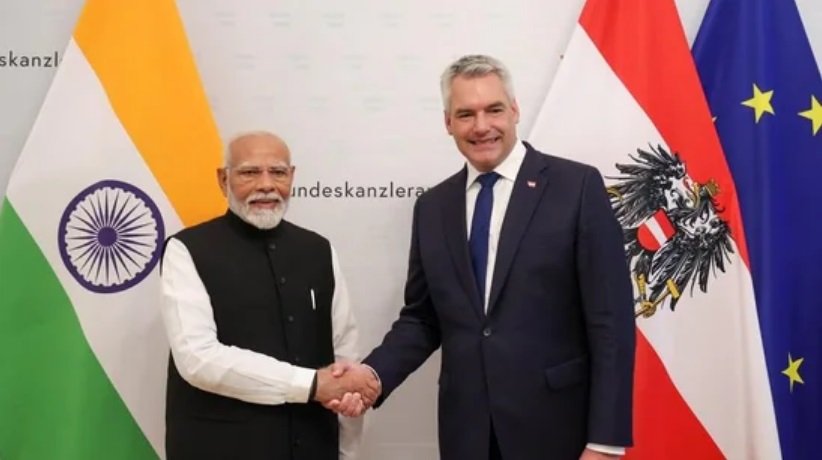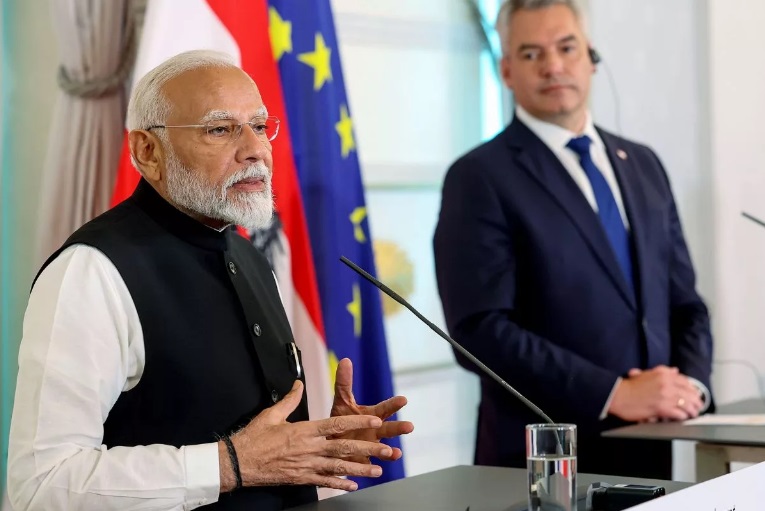
India and Austria push for end to conflict in Ukraine
PM Modi, during his visit to Austria, reiterated India’s stance on the Ukraine crisis, emphasizing the need for dialogue and diplomacy for peace and stability.
New Delhi: PM Narendra Modi on Wednesday reiterated India’s position that a solution to the Ukraine crisis cannot be found on the battlefield during his visit to Austria, conveying New Delhi’s assessment of the conflict.
The Ukraine war figured prominently in talks between Modi, the first Indian premier to travel to Vienna in 41 years, and Austrian Chancellor Karl Nehammer. The two sides also discussed ways to bolster cooperation in areas such as trade, investment, science and technology, green energy, and climate change.
Modi repeated the message he conveyed to Russian President Vladimir Putin in televised remarks at the Kremlin on Tuesday – peace talks under the shadow of guns can’t succeed and parties to the conflict need to return to dialogue. Nehammer said his discussions with Modi were an opportunity to find out about India’s assessment of the situation and to “familiarise India with European concerns”.
“Chancellor Nehammer and I have discussed in detail the ongoing conflicts around the world, whether it is the conflict in Ukraine or the situation in West Asia. I have said before that this is not a time for war. Problems cannot be solved on the battlefield,” Modi said after the talks, speaking in Hindi.
“The loss of innocent lives, anywhere, is unacceptable. India and Austria emphasise on dialogue and diplomacy for the earliest possible restoration of peace and stability. We are both ready to provide every possible cooperation to achieve this,” he said.

India and Austria, Nehammer said, are united by concerns over the geopolitical situation and the two leaders had “very intensive talks about the Russian war of aggression against Ukraine”. Pointing to Modi’s just concluded visit to Russia, Nehammer said: “It was particularly important for me to hear about the Prime Minister’s personal assessment regarding the intentions of Russia in respect of the peace process.”
Nehammer said it was an “important signal” that India participated in the recent peace summit on Ukraine hosted by Switzerland and the two sides had discussed “possibilities of reviving the peace process”. He pointed to India’s “unique position” in the Global South and its role as the largest democracy and said the country will be “more than important” for the peace process and future peace summits.
Austria, as a neutral country and a non-NATO member, will be available as a site for dialogue and is willing to “act as a bridge builder”, Nehammer said.
A joint statement issued after the talks said both leaders supported “any collective effort to facilitate a peaceful resolution” of the Ukraine war in line with international law and the UN Charter. “Both sides believe that achieving a comprehensive and lasting peace in Ukraine requires bringing together all stakeholders and a sincere and earnest engagement between the two parties to the conflict,” the statement said.
On the bilateral front, the discussions between the Indian and Austrian leaders focused on cooperation in trade, investment, science and technology, green energy, artificial intelligence, climate change, cultural cooperation and people-to-people ties.
Modi said he and Nehammer identified new opportunities to strengthen cooperation and decided to give strategic direction to bilateral ties. A blueprint for cooperation over the coming decades won’t be limited to economic cooperation, and the two sides will combine strengths in areas such as infrastructure development, innovation, renewable energy, water and waste management and quantum technology, he said.
A mobility and migration agreement signed by the two sides in 2023 will facilitate legal migration and movement of skilled workforce, he added.


